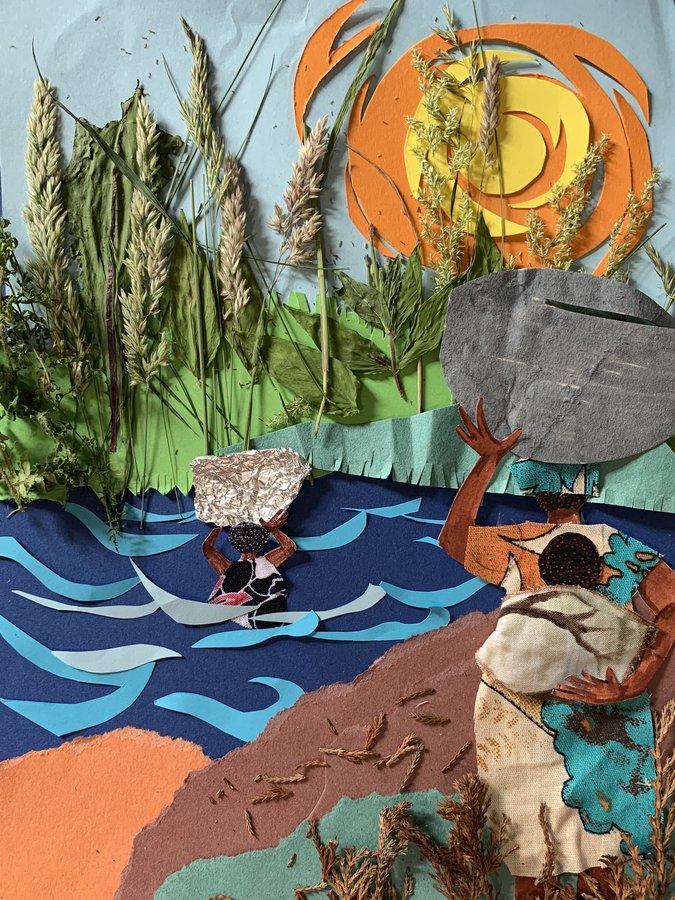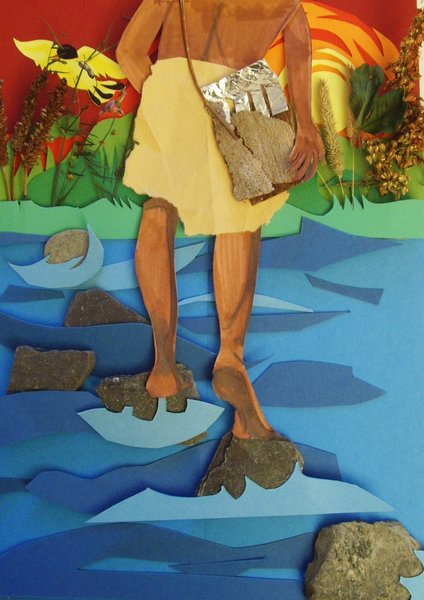
‘Zambuko’ art work by Tarneem Al Mousawi.
This blog is part one in a three-part series on 'expressions of travel' and is divided into three groupings – sezvazviri (literal); midziyo (items/objects); and zvirevo (proverbial).
In a previous project, we began to consider and apply language as a resource in the research process. This multilingual approach enabled us to further stretch ideas, expand meaning, offer new angles of looking at a topic, and increase understanding in building knowledge. The idea came during a creative arts workshop we hosted for colleagues working in a different hub within the same project.
In the workshop we used drama and creative writing techniques as a way of developing a ‘ways of working’ document between our two hubs. The idea actually did not come from one of the artists, but our colleague Dr Mariam Attia who visualised our linguistic resources as a ‘well’ that we can, if we want, draw on to utilise in our research endeavours. It was a real breakthrough moment, as we all became really excited by this image. To complement the English we automatically default to, as researchers we began tapping into our ‘other’ known languages – languages of our thinking, feeling, remembering, dreaming and expression.
In the same way that this approach enriched previous research, this is another effort to offer more insight into the experience of people-movement in this current project.
In this offering I turn, and return, to my mother tongue (Shona) to explore expressions to do with the movement of people. These mazwi e nzendo (expressions to do with travel) are from my own memory and also from several long, long-distance calls with my youngest ancestor – my elderly mother.
As I worked on gathering these, a pattern started to emerge, and I decided to put them into three groupings – sezvazviri (literal); midziyo (items/objects); and zvirevo (proverbial).

SEZVAZVIRI (literal)
kuoneka – saying farewell, both to humans, but also to acknowledge the spirit
kusimuka – take off on a journey; also literally to rise from sitting
kusvika - arrival
kusimudzira – to take off again, after rest or disruption
kudzoka – to return
nzira - path
kwawabva – where you come from
kwaunoenda – where you head
kutama – moving house, relocating; migrate
kufamba – walk or travel
kutekaira – (older Shona) to walk a long distance
kutambira – dance for, to welcome
kutambirwa – to be welcomed, literally to be greeted in dance
kumema – scoping/assessing, usually a terrain or for a hunter inspecting traps set prior
kusunga mbatya – to tie your clothes into a bundle, i.e. signal of leaving, mainly in leaving a home you have known, especially divorce situation
kuzungaira – wander, struggling to find direction in space; also wonder, struggling to find direction in thought
kupotera – to escape from your home for safety, or survival
mataga – temporary shelters built away from home, in order to perform a task such as guarding your field against invasion of monkeys/baboons
matongo – home now distant, unlikely or unsuitable to be revisited
musasa – temporary shelter built in the forest when out hunting or on a long journey
marimuka – situation of working in a distant place for the betterment of your home you have left behind
maricho – an unchosen task, usually undesirable, taken in order to survive in marimuka
zambuko – a crossing, usually a river
What are your own language resources? What expressions describe or influence your own sense of journey?



